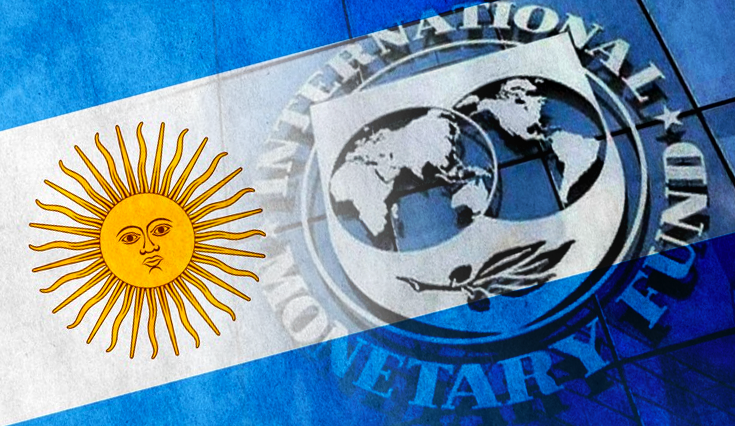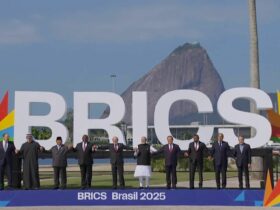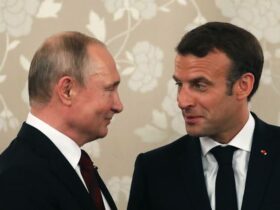In mid-2018, during Mauricio Macri’s three years in power (2015-2019), the International Monetary Fund (IMF) approved a historical loan for Argentina for 57 billion US dollars (USD), of which some 44 thousand were disbursed. The Minister of Economy, Martín Guzmán, has reported that at present: “Argentina owes around 44.5 billion dollars to the IMF.”
The government of the Frente de Todos had been in talks with the Fund since December 2019, and has finally reached what it considers: “the best possible agreement” with the largest multilateral credit institution at a global level.
Message from President Fernández
On the morning of Friday, January 28, 2022, the Argentine president gave a message to his country and the world, through which he made the agreement official:
“I want to announce that the Government of Argentina has reached an agreement with the International Monetary Fund. Governing is an exercise of responsibility. We had a problem, and now we have a solution. We had a noose around our necks, a sword of Damocles, and now we have a path that we can walk on. Without an agreement, we did not have a future horizon,” said the southern president.
He also added that: “With this agreement, we can order the present and build a future. Compared to other previous ones that Argentina signed, which we ought not to forget, this agreement:
– does not contemplate restrictions that delay our development;
– does not restrict, limit or condition the rights of our retirees that we recover in 2020;
– does not force us to a labor reform;
– promotes our investment in public works;
– does not impose a zero deficit goal;
– does not impact public services;
– does not relegate our social spending, and
– respects our investment plans in science and technology.
The Argentine Head of State continued: “This agreement does not condition us. We will be able to act exercising our sovereignty and carry out our policies of growth, development and social justice. It is an agreement based on the world’s confidence in our capabilities. We have to grow to be able to pay.”
“I have confidence in Argentina and in the general lines of this agreement that I will submit to the National Congress for its consideration. We need you to support this agreement and I therefore appeal to the national commitment of everyone. There is a future because we are strengthening this present. History will judge who did what. Who created a problem and who solved it. I invite you to look forward without forgetting the past.”
There was a very serious and urgent problem and now we have a possible and reasonable solution. It is time to unite in the solutions and not to divide ourselves in the problems. I trust Argentina, I trust Argentine men and women. Thank you for your attention, good morning”, Fernández concluded.
The details
Minister of Economy Martín Guzmán reported this January 28 at a press conference, saying that an agreement was reached with the IMF known as the “Extended Facility Program” (or Extended Fund Facility in English), which it will have a duration of two and a half years (far from the 10 years that Argentina initially proposed), and its main objective is the refinancing of the Stand By Program agreed to by Mauricio Macri in 2018.
Guzmán explained that the agreement is divided into two large blocks: on the one hand, the macroeconomic policy scheme. On the other hand, the so-called measures that promote medium-term growth and lasting stability. In turn, he argued that, from a macroeconomic point of view, there are four blocks:
First block: fiscal policy
The agreement includes a fiscal policy that does not inhibit the continuity of the recovery. The Argentine State will be able to play a moderately expansive role with public spending in real terms while growing moderately. Argentina was able to reach a policy agreement with the IMF without adjustment policies. It is proposed that there be a gradual reduction of the fiscal deficit on the basis of a recovering economy: for the year 2022, a primary fiscal deficit of 2.5% of GDP is projected, for 2023 it is projected at 1.9%; and for 2024, 0.9%.
Guzmán argued that there is going to be a greater targeting of State resources and a greater expansion of public investment that Argentina so badly needs to generate more productive capacity and for the private sector to have more vibrant activity.
Similarly, work will be done to strengthen the tax administration seeking to attack the evasion problems that have existed in Argentina (especially in the segment meant to make the biggest contributions) and also to have measures to attack money laundering problems, Guzmán said.
Second Block: financial policy
There will be a gradual but decisive reduction in the monetary assistance provided by the Central Bank of the Argentine Republic (BCRA) to the National Treasury. In 2021, monetary financing from the BCRA to the National Treasury was around 3.7% of GDP, which was a substantial reduction compared to 7.3% in the worst year of the pandemic, 2020.
In 2022 monetary financing will be 1% of the Argentine GDP; in 2023 around 0.6%; and in 2024 close to zero, entering a situation in which there is no more systematic financing from the BCRA to the National Treasury. In a more normalized economy, the money supply can move in a manner consistent with the evolution of demand by the Argentine local currency without this entailing additional pressure on the exchange rate and therefore on inflation.
Third block: monetary policy
A framework was agreed upon that aims to have a real interest rate structure that results in positive values in order to strengthen the demand for assets in local currency and contribute to exchange and financial stability. Likewise, on the financial front, work will continue on the reconstruction of the public debt market in local currency.
Regarding inflation, the Argentine government and the IMF agreed to maintain a comprehensive approach based on the premise that inflation is a multi-causal phenomenon, said the economy minister. There are four main factors of the inflationary phenomenon:
First is the productive factor: this relates to the historical inability of Argentina to achieve sustained growth of exports, which would make it so the country grows along with the demand for foreign currency. The country could then count on the foreign exchange for that growth to continue so the country does not face problems with a lack of reserves. There is a set of policies that aim to promote the development of certain sectors that have the capacity to generate foreign currency in our economy.
Secondly, we have the monetary fiscal scheme, Guzmán said in this regard: “what we need is to continue improving the financing profile of public policy and strengthening the sustainability of public finances”.
Third, there is the monetary policy based on aiming at a structure of positive real interest rates.
And finally, the Minister of Economy pointed to the coordinating role that the State plays in anchoring expectations. For this, the role of price and income policies is fundamental. Price agreements are going to have an important role and space, between the public and private sectors, in the inflationary scheme.
Fourth block: external and exchange rate policy
In this regard, Guzmán stated that: “There is not going to be any change in the exchange rate. The exchange rate policy will continue in the line in which it has been carried out. This sets an objective for the accumulation of international reserves and a goal for 2022 of growth in international reserves of USD 5 billion”.
The economy minister added that “there will continue to be regulations in the financial account that prevent Argentina from going through a situation of instability. It points to a horizon of macro prudential regulations such as curbing the outflow of speculative capital. All the rights of our retirees will be maintained, there is no labor reform, there is no privatization of public companies.”
Summary
Most outstanding points of the IMF agreement
- Argentina was able to reach a policy agreement with the IMF without adjustment policies.
- The agreement includes a fiscal policy that does not inhibit the continuity of the recovery.
- All the rights of retirees will be maintained, there is no labor reform, there is no privatization of public companies.
- It is proposed that there be a gradual reduction of the fiscal deficit on the basis of a recovering economy.
- For the year 2022, a primary fiscal deficit of 2.5% of GDP is projected and for the year 2023 this variable takes the value of 1.9%; and for 2024, 0.9%.
- In 2022 monetary financing will be 1% of the Argentine GDP; in 2023 around 0.6%; and in 2024 close to zero, entering a situation in which there is no more systematic financing from the BCRA to the National Treasury, that is to say, to the Executive.
- There will be no exchange rate jump. The exchange rate policy will continue in the line in which it has been carried out.
- A framework was agreed upon that aims to have a real interest rate structure that results in positive values.
- Price agreements are going to have an important role and space in the inflation scheme.
- Financing has been negotiated for an amount equivalent to the amount of the Stand by Program agreed to by the government of Mauricio Macri. That is, around 44 thousand 500 million dollars.
IMF statements
On January 28, 2022, an International Monetary Fund (IMF) team, led by Julie Kozack, Deputy Director of the Western Hemisphere Department, and Luis Cubeddu, mission chief for Argentina, issued the following statement:
“IMF staff and the Argentine authorities have reached an understanding on key policies as part of their ongoing discussions of an IMF-supported program. The main areas of agreement include the following:
IMF staff and the Argentine authorities have agreed on the fiscal consolidation path that will form a key policy anchor of the program. The agreed upon fiscal path would gradually and sustainably improve public finances and reduce monetary financing. Importantly, it would also allow for spending increases on infrastructure and science and technology, and would protect targeted social programs. We agreed that a strategy to reduce energy subsidies in a progressive manner will be essential for improving the composition of government spending.
We have reached understandings on a framework for monetary policy implementation as part of a multipronged approach to addressing persistent high inflation. This framework aims to deliver positive real interest rates to support domestic financing and strengthen stability.
We have also agreed that additional financial support from Argentina’s international partners would help bolster the country’s external resilience, and its efforts to secure more inclusive and sustainable growth.
IMF staff and the Argentine authorities will continue their work in the coming weeks towards reaching a Staff-Level Agreement. As is always the case, final agreement on a program arrangement would be subject to approval of the IMF’s Executive Board,” ends the statement.
For her part, also on January 28, the head of the IMF, Kristalina Georgieva, tweeted: “Encouraged by today’s progress between IMF staff and Argentina’s authorities on reaching an understanding on key policies for an IMF-supported program to tackle current challenges such as inflation and secure more inclusive & sustainable growth for the Argentine people.”
Considerations
This new roadmap of the Frente de Todos government with the International Monetary Fund (IMF) is only beginning to come to fruition. In this context, the Casa Rosada, commanded by Alberto Fernández, has concrete reasons to feel momentary relief at having gained time in the battle with the IMF.
However, the agreement with the IMF still needs to be debated and approved by the Argentine Congress. This will happen only in the month of March after the completion of the extraordinary sessions to which the Executive Power summoned the Legislative Power, which will be taking place throughout February.
The new program with the IMF will last for 2 and a half years. The Argentine government and the IMF still have to work on a Memorandum of Understanding on economic and financial policies. It is likely that the opposition, inside and outside Congress, will seek to pressure the Executive in order to influence the fine print of the agreement.
Furthermore, not everyone in the governing coalition welcomes the agreement with the IMF. In fact, a sector of the Frente de Todos believes that “there is nothing to celebrate”, insofar as the IMF will now be monitoring government policies and influencing the most sensitive issues, not only in terms of the economy and finances. In a nutshell, they argue, Argentina is once again giving the keys to the country to the IMF.

















Leave a Reply